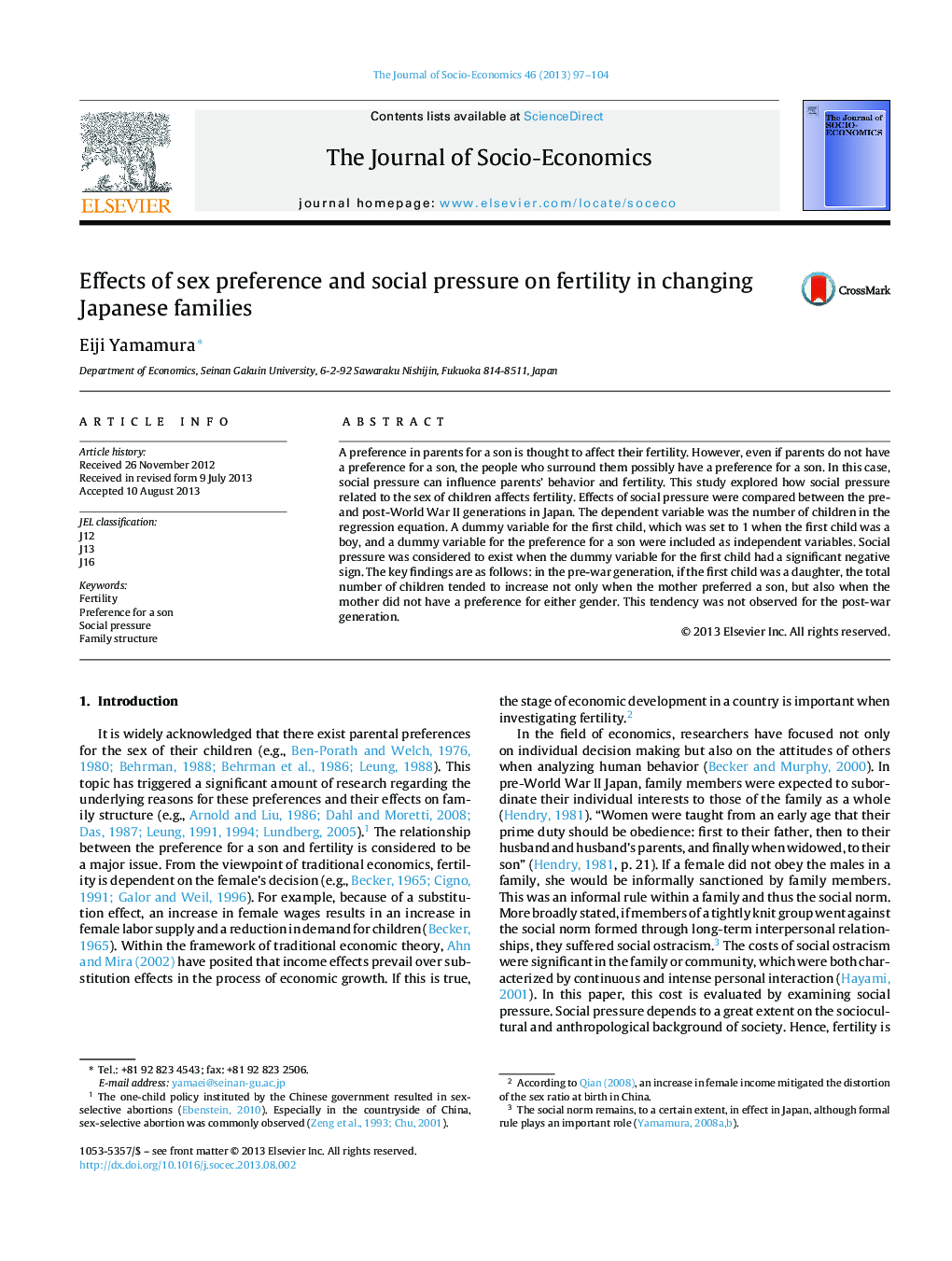| کد مقاله | کد نشریه | سال انتشار | مقاله انگلیسی | نسخه تمام متن |
|---|---|---|---|---|
| 7370623 | 1479532 | 2013 | 8 صفحه PDF | دانلود رایگان |
عنوان انگلیسی مقاله ISI
Effects of sex preference and social pressure on fertility in changing Japanese families
ترجمه فارسی عنوان
اثرات ترجیح جنسی و فشار اجتماعی بر باروری در تغییر خانواده های ژاپنی
دانلود مقاله + سفارش ترجمه
دانلود مقاله ISI انگلیسی
رایگان برای ایرانیان
کلمات کلیدی
ترجمه چکیده
فرض بر این است که والدین برای والدین بر فرزند خویش تأثیر می گذارند. با این حال، حتی اگر والدین اولویت فرزند خود را نداشته باشند، افرادی که آنها را احاطه کرده اند احتمالا یک فرزند را ترجیح می دهند. در این مورد، فشار اجتماعی می تواند بر رفتار و باروری والدین تاثیر بگذارد. این مطالعه به بررسی اینکه چگونه فشار اجتماعی مربوط به جنس فرزندان بر باروری تاثیر می گذارد. تأثیر فشار اجتماعی بین نسل های قبل و بعد از جنگ جهانی دوم در ژاپن مقایسه شد. متغیر وابسته، تعداد فرزندان در معادله رگرسیون بود. متغیر ساختگی برای اولین بار که برای اولین بار به عنوان یک پسر تعریف شد و متغیر ساختگی برای اولویت برای یک پسر به عنوان متغیر مستقل به شمار می رفت. زمانی که متغیر ساختگی برای اولین بار یک نشانه منفی معنی دار بود، فشار اجتماعی در نظر گرفته شد. یافته های کلیدی به شرح زیر است: در نسل قبل از جنگ، اگر اولین فرزند دختر بود، تعداد کل فرزندان نه تنها افزایش می یابد، بلکه زمانی که مادر ترجیح می دهد فرزند خود را انتخاب کند یا جنسیت این تمایل برای نسل بعد از جنگ مشاهده نشد.
موضوعات مرتبط
علوم انسانی و اجتماعی
اقتصاد، اقتصادسنجی و امور مالی
اقتصاد و اقتصادسنجی
چکیده انگلیسی
A preference in parents for a son is thought to affect their fertility. However, even if parents do not have a preference for a son, the people who surround them possibly have a preference for a son. In this case, social pressure can influence parents' behavior and fertility. This study explored how social pressure related to the sex of children affects fertility. Effects of social pressure were compared between the pre- and post-World War II generations in Japan. The dependent variable was the number of children in the regression equation. A dummy variable for the first child, which was set to 1 when the first child was a boy, and a dummy variable for the preference for a son were included as independent variables. Social pressure was considered to exist when the dummy variable for the first child had a significant negative sign. The key findings are as follows: in the pre-war generation, if the first child was a daughter, the total number of children tended to increase not only when the mother preferred a son, but also when the mother did not have a preference for either gender. This tendency was not observed for the post-war generation.
ناشر
Database: Elsevier - ScienceDirect (ساینس دایرکت)
Journal: The Journal of Socio-Economics - Volume 46, October 2013, Pages 97-104
Journal: The Journal of Socio-Economics - Volume 46, October 2013, Pages 97-104
نویسندگان
Eiji Yamamura,
